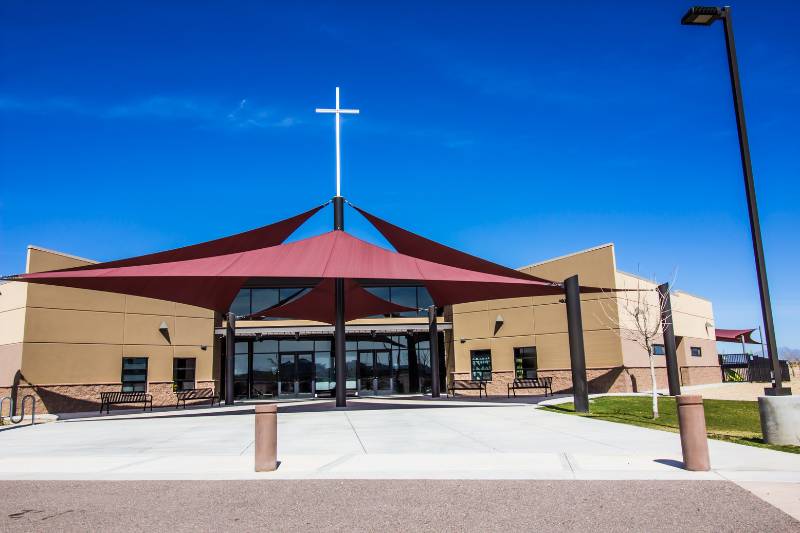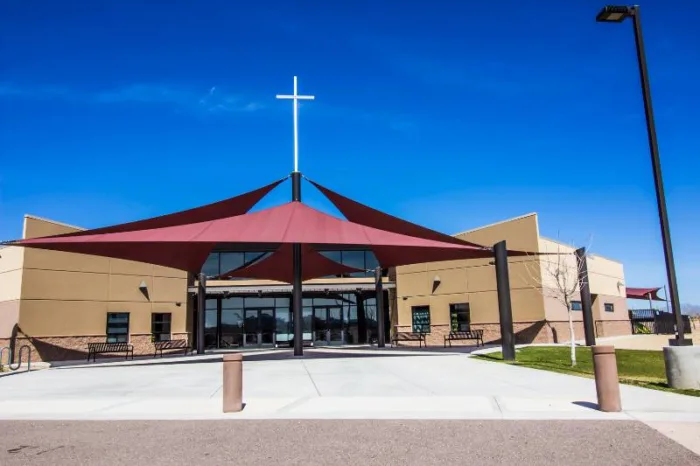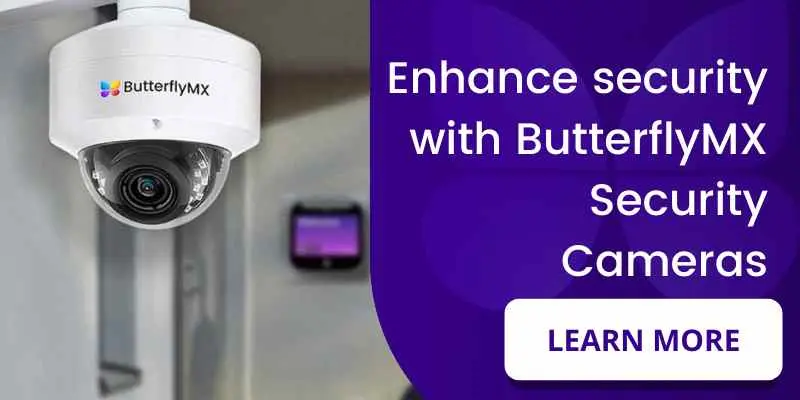Key takeaways
- Churches must balance creating an open and welcoming environment with ensuring the safety of staff, congregation members, and property. Modern security systems can help address risks like theft, vandalism, and unauthorized access.
- Secure your church by implementing security equipment — cameras, access control, alarms — and policies, such as risk assessments, emergency response plans, and 24/7 monitoring.
- Combining access control, surveillance, and alarm systems into a unified platform simplifies security operations. This integration allows church administrators to monitor and manage security more efficiently while keeping costs manageable.

Churches, synagogues, temples, mosques, and other places of worship have faced increasing concerns with physical security risks. Consequently, church security systems have never been more important.
This buyer’s guide will help you continue cultivating a welcoming and secure atmosphere for all members. You’ll discover why churches should have security systems, what equipment to implement, and what to consider when choosing a solution. Most importantly, you’ll find the best church security system.
This post covers:
- What does church security do?
- How can I secure my church?
- Should churches have security?
- How do you organize church security?
- What is the best security for churches?
- Church security FAQs
What does church security do?
Church security involves installing several security devices and policies to protect members, staff, and property. This includes monitoring the premises to prevent unauthorized access, responding to potential threats or disturbances, and ensuring that emergency procedures are in place and well practiced. Church security personnel often collaborate with local law enforcement to enhance safety measures and address any specific concerns related to their congregation. Their role also extends to creating a welcoming yet secure environment where individuals can worship and gather without fear.
How can I secure my church?
There are two primary ways to secure your church: equipment and procedures. It’s best to implement a combination of security equipment and safety procedures for the most effective solution. Thus, you’ll lower the risk of security breaches and ensure a comprehensive approach to protecting your church community.
Commonly used church security equipment includes:
- Access control systems
- Smart locks
- Elevator controls
- Security cameras and video surveillance
- Alarm systems
- Sensors
- Fire and emergency systems
- Cybersecurity systems
- Metal detectors and turnstiles
- Gates or barrier arms
- Visitor management systems
- Panic buttons
Consider some of these security procedures to increase safety at your church:
- Emergency response plans
- Annual physical security assessment
- Security and safety training
- Cybersecurity penetration testing
- 24/7 monitoring
- Lockdown procedures
- Law enforcement partnerships
- Communication protocols
- Security patrolling
Should churches have security?
Yes, churches should have security because it helps maintain the congregation’s safety.
Unfortunately, churches are not immune to security risks such as vandalism, theft, harassment, and even violence. In fact, hostility and violence toward churches are higher than ever before. In 2023, there were at least 915 acts of hostility targeting churches, which included vandalism, gun violence, bomb threats, arson, and more.
Therefore, many religious institutions have enhanced their security measures to protect their communities and properties by installing security cameras, employing security personnel, conducting risk assessments, or implementing emergency response protocols.
How do you organize church security?
Churches vary in size, architectural styles, and locations and serve diverse demographics, making the selection of an appropriate security system complex. As a result, organizing an appropriate security system is complex. Indeed, there is no universal church security system, as each congregation’s needs and circumstances differ.
So, when choosing a church security system, consider the following:
- Integrations. Simplify the security of your church with a system that integrates with other software and hardware your property uses. Therefore, you’ll have peace of mind with a holistic security approach for your church, and employees can operate more efficiently.
- Ease of use. Ensure your employees and churchgoers know how your security system works to reduce potential security breaches or mishaps. An easy-to-use church security system will protect you more effectively than one that’s complicated to manage.
- Scalability. Expand your security system alongside your congregation. As your church grows over time, your security should do the same, so look for a system that can easily scale and meet your needs as time goes on.
- Flexibility. Your security system should be applied across all types of environments and entryways at your church. A flexible security system is best because it adheres to your church’s unique entryways and areas, increasing your facility’s security without additional costs.
- Future-proof. Invest in security that will last long after it’s installed. For instance, implement a cloud-based security system, as it can receive updates and new features after it’s installed. In turn, you won’t have to invest in another security system any time soon.
- Remote functionality. Manage your church security with a system that supports remote functionality through an online portal or mobile app. Thus, you’ll have insight into your church and can even manage it regardless of where you are.
Learn how ButterflyMX works:
What is the best security for churches?
The best security system for churches is ButterflyMX.
ButterflyMX is a cloud-based access control and security camera company installed in over 15,000 buildings. With a property-wide access solution, ButterflyMX enables users to enter the areas they need with their smartphones while allowing property managers to manage their system from anywhere using the online dashboard or mobile app.
The ButterflyMX access control platform includes the following features:
- ButterflyMX Bullet and Dome Cameras for both indoor and outdoor use with simple installation and HD video that stores footage in the cloud and locally.
- Our Security Cameras record 24/7 but footage can be tethered to access events occuring at your property, so that you can easily review the footage that matters.
- Keypads and readers that accept multiple credentials: smartphones, PIN codes, key cards, and fobs.
- Integrate your surveillance cameras, smart locks, software, and more with your access control system for a comprehensive security solution.
- Vehicle readers and windshield tags provide touchless/keyless entry into your parking facilities.
- A detailed audit log gives you information regarding who accessed what areas, which is stored for up to a year.
- Manage your system remotely by using the ButterflyMX mobile app or the online dashboard.
- Enable your congregation to reserve amenity spaces for events using the amenity reservation feature in the mobile app.
- Implement elevator controls to manage who has access to certain floors in your church.
- Use a single platform to manage access across your entire property, from public areas and elevators to garages and administrative offices.
Church security FAQs
- Do churches have security systems?
- How much does a church security system cost?
- What does a church security officer do?
- Should a church have armed security?
- Do churches need cybersecurity?
- Do churches have cameras?
- Do churches have to abide by OSHA?
Do churches have security systems?
Most churches should have security systems, but many do not. This is particularly true for churches and likewise religious facilities outside major cities. As a result, whether a church has a security system or not usually depends on the church’s size, location, and resources. In addition to physical security, some churches also implement emergency plans and may employ security personnel or use volunteer ushers trained in safety protocols.
How much does a church security system cost?
A church security system can cost $1,500 to more than $6,000.
Of course, cost will vary on many different factors, such as:
- Size of the church
- Number of entryways and areas
- Location
- Type of system
- Equipment
- Features
- Security provider
It’s important to note the price range does not include installation fees, maintenance, and any potential subscription fees you may incur.
What does a church security officer do?
Church security officers protect the facility, employees, and the congregation from potential security threats.
More specifically, the duties of a church security officer include, but are not limited to:
- Monitoring video surveillance
- Coordinating with local law enforcement
- Responding to emergencies and alerts
- Ensuring compliance with government regulations
- Patrolling interior and exterior areas
- Maintaining security records and policies
- Investigating and identifying security breaches or risks
- Securing all entryways and areas
Should a church have armed security?
It depends on your security needs and what your congregation is comfortable with.
As mentioned above, a church security officer will likely be armed in some way. Armed security can be a useful deterrent. However, there are many other less dangerous and threatening security options.
Do churches need cybersecurity?
Yes, churches need cybersecurity to protect their congregation’s sensitive information from being stolen.
Do churches have cameras?
Churches may have cameras depending on their size and location. Larger churches in urban areas are likely equipped with security cameras, whereas rural churches or smaller congregations may not.
Do churches have to abide by OSHA?
Yes, churches have to abide by the Occupational Safety and Health Act (OSHA) if they have employees performing secular activities, such as teachers at a church-run school or those performing administrative tasks. These employees are protected under OSHA.
Employees performing religious activities for a church are not protected by OSHA.

Get your free quote!
Fill in the form below, and we'll email you right back.
Want a free quote?
Fill in the form below, and we'll email you right back.
You’ll be redirected shortly...






